Key takeaways:
- Homelessness is a complex issue influenced by various societal factors, and charity can provide temporary relief but should also focus on empowering individuals through ongoing support.
- Resilience is vital for overcoming adversity, and personal stories of strength can inspire not just individuals but also communities.
- Practical strategies for fostering resilience include cultivating gratitude, setting small goals, and connecting with supportive people.
- Charity work has long-term impacts, creating networks of support and fostering personal growth and empathy in both givers and recipients.
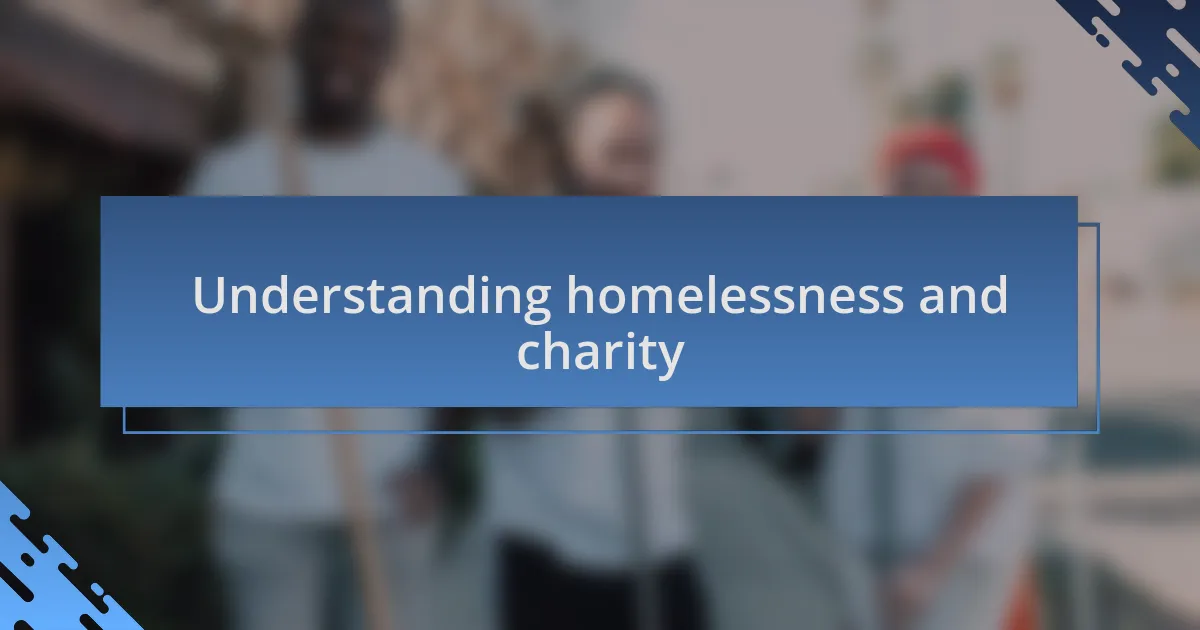
Understanding homelessness and charity
Homelessness is often misunderstood, a complex issue intertwined with various societal factors like poverty, mental health, and systemic failures. I remember a time when I encountered a man on the street who shared his story of losing stable housing after a medical emergency. It made me realize that homelessness is not just a lack of shelter, but often a cascade of unfortunate events that can happen to anyone.
Charity plays a pivotal role in providing immediate relief, but it’s essential to understand its limitations. I’ve witnessed firsthand how a warm meal or a safe place to sleep can momentarily lift someone’s spirits, yet it’s the ongoing support—like job training and mental health services—that truly fosters lasting change. This begs the question: how do we ensure that our charitable efforts truly empower those in need rather than merely offering temporary solutions?
When we think about charity, we must recognize the importance of dignity and respect in our approach. I recall volunteering at a local shelter where we focused on building relationships, not just handing out resources. This experience taught me that charity should be about connection and understanding, inviting us to see the humanity behind each struggle. Isn’t it essential that we look beyond labels and truly engage with people’s stories?
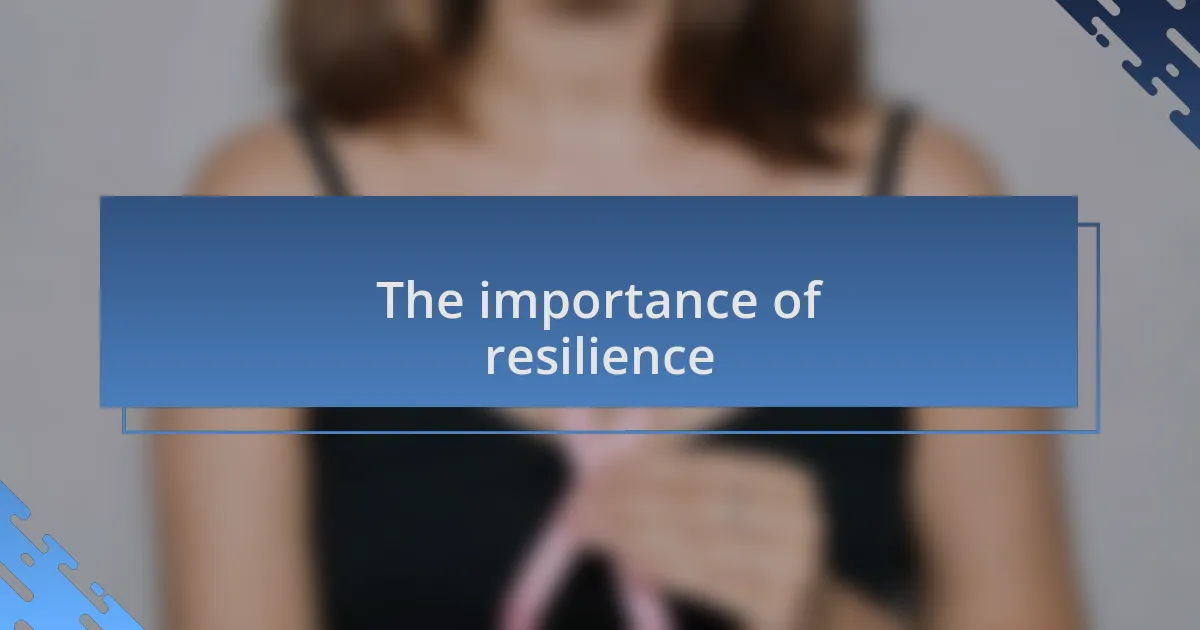
The importance of resilience
Resilience is a cornerstone for anyone navigating tough times, especially those facing homelessness. I recall meeting a young woman who had lost everything; her strength amazed me. Despite her dire circumstances, she spoke about her dreams of creating a better life. It made me realize that resilience isn’t just about surviving; it’s about finding hope and purpose even when the odds seem stacked against you.
The ability to bounce back from setbacks can shape one’s approach to adversity. I once supported a man who was struggling to find work after experiencing homelessness. He shared how each rejection became a lesson rather than a failure. It struck me that resilience allows individuals to reframe their stories—turning pain into growth. How often do we give ourselves permission to learn from our hardships?
Moreover, resilience fosters a sense of community. When I volunteered alongside people who had faced hardships, I noticed how we all uplifted each other. Each story shared—of struggles and triumphs—became a source of strength. Isn’t it inspiring to think that resilience can not only change individual lives but also inspire and empower a community?
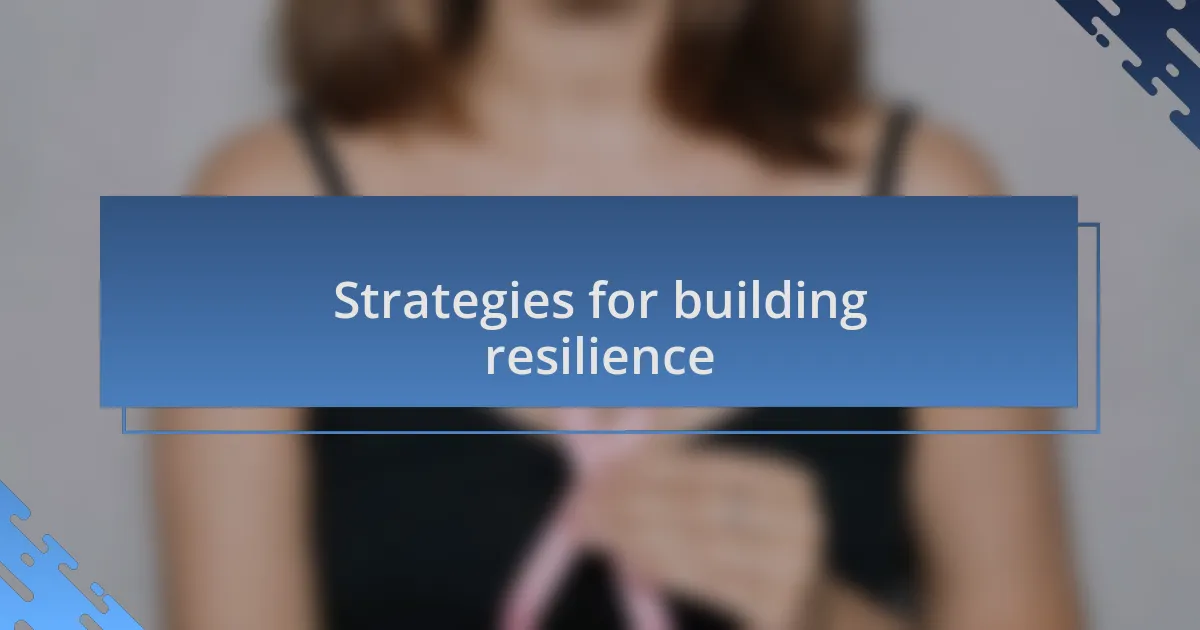
Strategies for building resilience
Developing resilience requires intentional strategies, and one that I’ve found particularly effective is fostering gratitude. I remember a time when I volunteered in a shelter, and after hearing the stories of individuals rebuilding their lives, I started a daily practice of noting what I was grateful for. This simple act shifted my perspective, helping me appreciate the small victories in life—the warmth of a smile or the kindness of a stranger. How often do we overlook the positives while immersed in challenges?
Another powerful strategy is setting small, achievable goals. I once guided a participant in a job training program who felt overwhelmed by the thought of job hunting. Instead of focusing on the end goal, we broke it down into manageable tasks, like updating a resume or practicing interview skills. With each completed step, I saw a spark of confidence grow in him. Isn’t it amazing how small successes can build momentum and reshape our outlook?
Additionally, connecting with supportive people is crucial for resilience. I’ve noticed that when I surrounded myself with those who understood my struggles, my own strength amplified. During tough periods, I leaned on friends and mentors who encouraged me and offered insights based on their experiences. Isn’t it comforting to know that sharing our burdens can lighten the load, revealing a path forward?
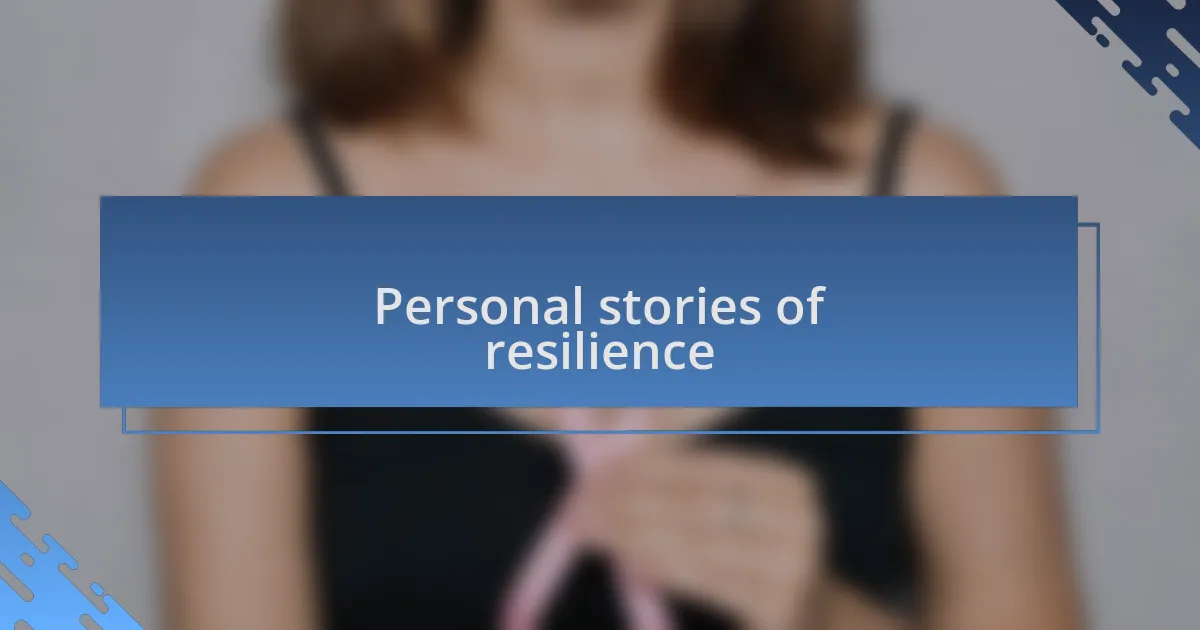
Personal stories of resilience
It’s incredible how personal stories of resilience can inspire change. I recall a woman I met in a transitional housing program who had lost everything. Despite her circumstances, she began painting in her spare time, allowing her emotions to flow onto the canvas. I often wonder how many people overlook creative outlets as a means of healing and rebuilding. For her, each stroke of paint wasn’t just art; it was a testament to her journey and determination to rise above her struggles.
I also think about a young man who faced numerous rejections when seeking employment after homelessness. Instead of allowing these setbacks to deter him, he changed his approach. He sought feedback after every interview, learning and evolving with each experience. The resilience he displayed taught me that sometimes the best lessons come not from success, but from our willingness to adapt and grow. Does embracing failure as a stepping stone toward success resonate with your personal experiences?
Witnessing the story of a group that formed a peer support network was quite moving. Individuals who had shared similar struggles came together to uplift one another. One member, who had once felt isolated and hopeless, found solace not just in speaking, but in actively listening to others. It illuminated for me the transformative power of community—how strength multiplies when we unite. Isn’t it fascinating how resilience can thrive in the warmth of companionship?

Supporting others through charity
Supporting others through charity can be a powerful way to foster resilience, both for those in need and for the volunteers who participate. I once volunteered at a food bank and was struck by the gratitude of the individuals I served. They would share their stories with me, often filled with struggle but also glimmers of hope. Listening to their experiences made me realize how vital it is to provide not just food but also companionship and support, creating a space where they felt valued and heard.
In another instance, I organized a clothing drive for a local shelter, and it opened my eyes to the tangible impact we can have through charity. As we sorted donations, I noticed a woman searching through the piles of clothes. When she found a warm winter coat, her face lit up. In that moment, I understood that charity goes beyond just giving; it’s about uplifting someone’s spirit. Have you ever witnessed a small act of kindness transform someone’s day? I believe that these moments remind us why supporting others is essential—not just for those receiving help, but for ourselves as well.
I’ve also been part of initiatives where we collaborated with local businesses to provide job training and resources for the homeless. Watching participants regain their confidence through skill-building workshops was a testament to the power of charity. One participant shared how learning to update a resume changed her outlook on life; she felt empowered and ready to take the next step toward independence. Isn’t it extraordinary how, through cooperation and compassion, we can ignite a sense of hope and resilience within our communities?

Practical ways to contribute
One practical way to contribute is by hosting community meals, where everyone can gather in a warm and welcoming environment. I remember organizing a potluck dinner with friends, which not only fed those in need but also created an atmosphere of connection and camaraderie. Sharing stories over a meal reminds us that everyone has something to offer, and it fosters a sense of belonging that is often missing for those facing homelessness.
I also encourage individuals to consider mentoring programs for the homeless. When I participated as a mentor, it was incredibly rewarding to see someone develop new skills and gain confidence. It’s amazing how just a few hours of your time can illuminate someone’s path toward self-sufficiency. Have you ever had a mentor who believed in you? The impact of that belief can be life-changing.
Donating supplies to shelters is another straightforward yet impactful way to help. I vividly recall collecting hygiene kits to distribute, and the expressions of relief from recipients were deeply moving. It made me realize that basic necessities like soap and toothpaste can provide dignity and comfort. What small acts can you take today to contribute? Even the simplest donation can make a significant difference in someone’s life.
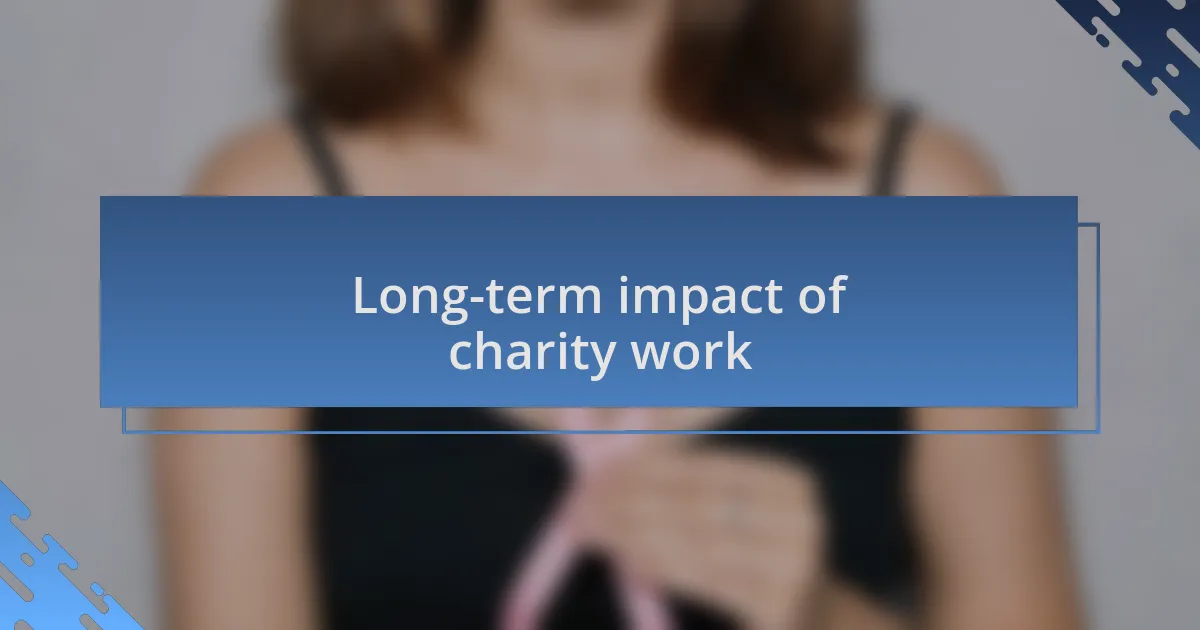
Long-term impact of charity work
When we engage in charity work, the effects often ripple far beyond the initial act. I recall volunteering at a local shelter where we organized career development workshops. Seeing individuals step outside their comfort zones, learning to revise resumes, and practice interview skills was a transformative experience. It reinforced my belief that charity is not just about giving; it’s about empowering people to reclaim their narratives and navigate towards a brighter future.
The long-term impact of charity work also shapes our communities. I once facilitated a workshop that brought together various local nonprofits. This collaboration cultivated a network of support that continues to thrive, providing ongoing resources for those in need. Have you ever witnessed how collective efforts can compound into lasting change? It’s astounding how one initiative can create a whole ecosystem of support, fostering sustainability and resilience in our neighborhoods.
Moreover, charity work nurtures personal growth within ourselves as givers. Reflecting on my experiences, I’ve learned more about empathy and gratitude through the challenging stories of those I’ve met. Each encounter became a lesson, teaching me resilience in my own life. Isn’t it fascinating how our attempts to uplift others can ultimately enrich our own experiences in profound ways?